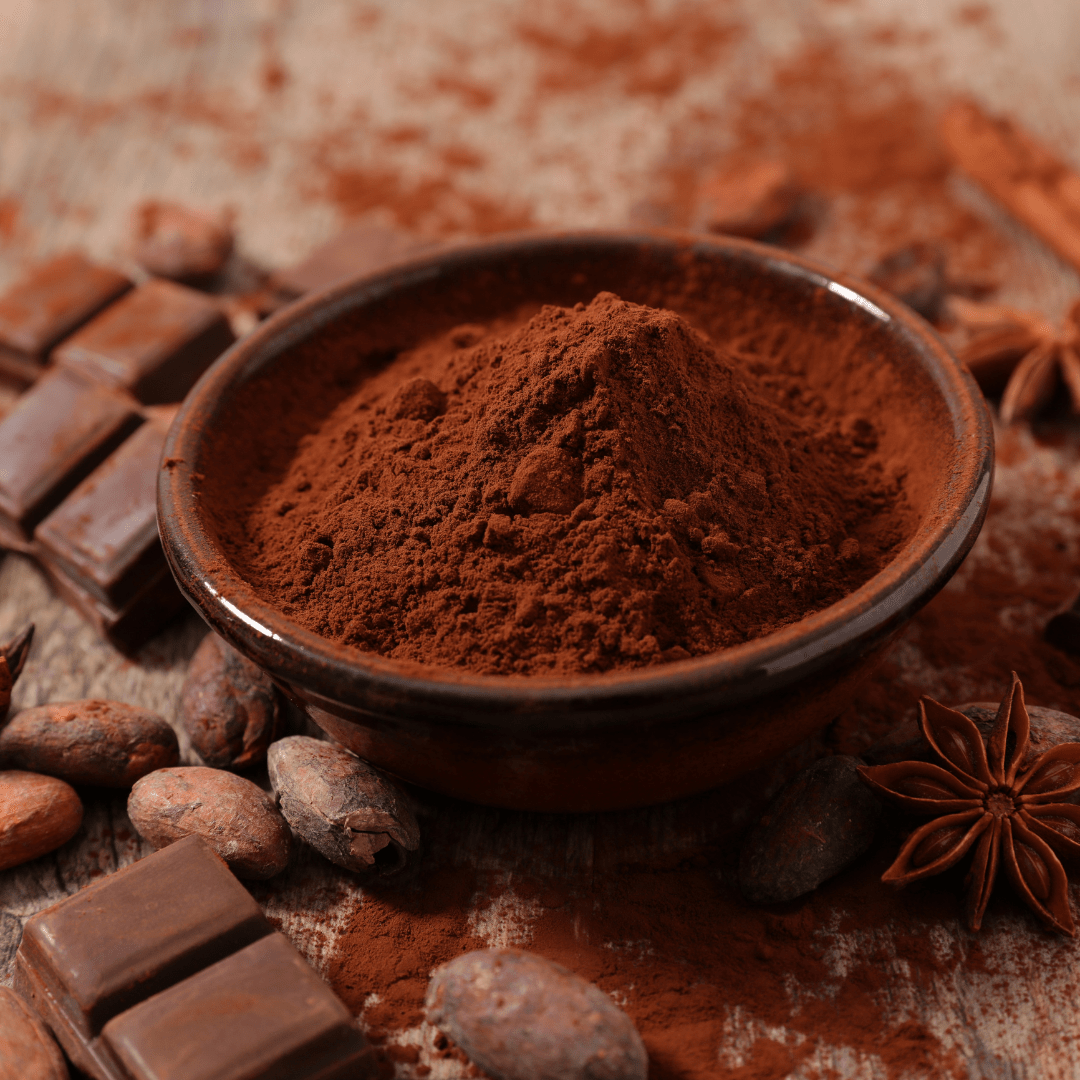
Ultimate Guide to Choosing the Perfect Cocoa Powder for Baking
|
|
Time to read 4 min

|
|
Time to read 4 min
Today, we're taking a look at our Ultimate Guide to Choosing the Perfect Cocoa Powder for your Baking. Whether you're whipping up decadent brownies, exquisite cakes, or delightful cookies, the type of cocoa you select can make all the difference in your baked creations.
Before we dive into selecting the ideal cocoa for your baking endeavors, let's explore the three main types of cocoa powders commonly found on the market:
1. Unsweetened Cocoa Powder:
This is the purest form of cocoa powder, produced by grinding cocoa beans and removing the cocoa butter, thus leaving the cocoa solids. This cocoa is perfect for recipes where the cocoa flavor needs to shine through, such as in brownies and dark chocolate cakes.
2. Dutch-Processed Cocoa Powder:
Also known as alkalised or European-style cocoa, this type is treated with an alkaline solution to neutralize its natural acidity. The result is a milder, smoother cocoa with a darker color. Dutch-processed cocoa is often used in recipes where a more delicate chocolate flavor is desired, like chocolate truffles or chocolate sauces.
3. Natural Cocoa Powder:
Made from cocoa beans that have been roasted and processed without alkaline treatment, natural cocoa powder retains a more acidic, slightly fruity flavor. It's an excellent choice for recipes that call for baking soda as the leavening agent, as the acidity helps activate the baking soda's rising power.
Now that you're acquainted with the cocoa powder trio, let's dive into how to choose the perfect one for your baking requirements:
1. Flavour Profile:
Consider the flavor profile you want to achieve in your baked goods. If you're after an intense chocolate punch, opt for unsweetened cocoa powder. For a mellower chocolate taste, go for Dutch-processed cocoa. Natural cocoa powder sits in between with its balanced acidity and moderate chocolate flavour.
2. Leavening Agents:
Think about the leavening agents in your recipe. If your recipe calls for baking powder, you have more flexibility in your cocoa choice. But if baking soda is the leavening agent, natural cocoa powder is your best bet due to its acidity, which will help with proper rising.
3. Colour and Appearance:
The type of cocoa you choose can affect the colour of your baked goods. Unsweetened cocoa powder tends to produce a darker result, while Dutch-processed cocoa yields a more reddish-brown hue. Natural cocoa powder leads to a lighter, reddish colour in your bakes.
4. Recipe Adaptation:
While recipes usually specify the type of cocoa to use, don't hesitate to experiment. Just be cautious when substituting one type for another, as the acidity and chemical reactions could impact the outcome.
5. Quality Matters:
Invest in good-quality cocoa powder. Look for brands that use high-quality cocoa beans, as this will translate to richer flavors in your baked goods.
Choosing the right cocoa powder for your baking ventures is like selecting the perfect brushstroke for a masterpiece. The type you choose will influence the flavour, colour, and texture of your creations. So, next time you embark on a baking adventure, remember the differences between unsweetened, Dutch-processed, and natural cocoa powders, and let your culinary imagination run wild!
At Dello Mano, we obsess over cocoa quality not just in theory, but in every bite. Our Chocolate Milkshake Mudcake is a perfect example: made with rich Belgian chocolate and cocoa, it’s smooth, dense, and deeply indulgent. The cocoa isn’t just an ingredient, it’s the flavour foundation.
“Want to experience the flavour difference premium cocoa makes? Our Chocolate Milkshake Mudcake is made with Belgian chocolate and cocoa powder — rich, smooth, and intensely satisfying.”
As you explore the world of cocoa, why not experience it in its most indulgent form?
Our Chocolate Lover’s Gift Box pairs rich Belgian chocolate truffles, dusted in fine cocoa powder with our famous handmade Luxury Brownies™.
It’s the perfect chocolate gift for birthdays, thank-yous, or heartfelt gestures.
🎁 Crafted for true chocolate lovers, and delivered Australia-wide.
Still curious about cocoa? Explore our 41 Cocoa FAQs for deeper knowledge
Dutch-processed cocoa is treated to reduce acidity, giving it a smoother flavour and darker colour. Natural cocoa is more acidic with a lighter, fruitier taste.
Sometimes, but not always. If your recipe uses baking soda, it’s likely expecting natural cocoa. Dutch-processed works better with baking powder. Flavour and colour may also change.
Look for premium brands at specialty grocers or try it in action
Natural cocoa is acidic and can react with baking soda to help baked goods rise. Dutch-processed cocoa is neutral, so it usually pairs with baking powder instead.
Dutch processing uses an alkalising treatment that changes the pH level of the cocoa, reducing acidity and creating a smoother, darker powder with mellow flavour.
Yes. Natural cocoa typically retains more fat unless it's defatted. This impacts richness and mouthfeel. Premium brands often disclose cocoa butter content on the label.
Cocoa contributes Maillard reactions, deepening colour and creating complex flavour notes, especially in recipes with added dairy or sugar, which enhance those reactions.
No, cocoa powder is pure ground cocoa solids, while hot chocolate mixes contain added sugar, milk powder, and other ingredients. They’re not interchangeable in baking.
At Dello Mano, cocoa powder is more than an ingredient, it’s the foundation of our chocolate craft. From silky mousse layers to rich mudcakes, every cake is handmade with Belgian chocolate and cocoa expertise built over 18 years. Discover our Chocolate Cakes Collection and taste the difference that true small-batch baking makes.
By Those Who Know Luxury

Deborah Peralta
About the Author
Deborah is a food scientist and marketing professional with a background in new product development for major food brands. Now co-founder of Dello Mano, she brings over 18 years of hands-on experience crafting premium handmade brownies, cakes, and chocolate creations. Her work blends technical precision with creative flair, championing small-batch baking, thoughtful gifting, and the joy of sharing beautiful handmade food.
Imagery Note
All imagery is created exclusively for Dello Mano. Cakes and Brownies are photographed and styled by our team, and some supporting scenes are artistically generated or enhanced to reflect our handmade aesthetic. Every image is designed to express the spirit of small-batch craft, care, and calm that defines Dello Mano.

